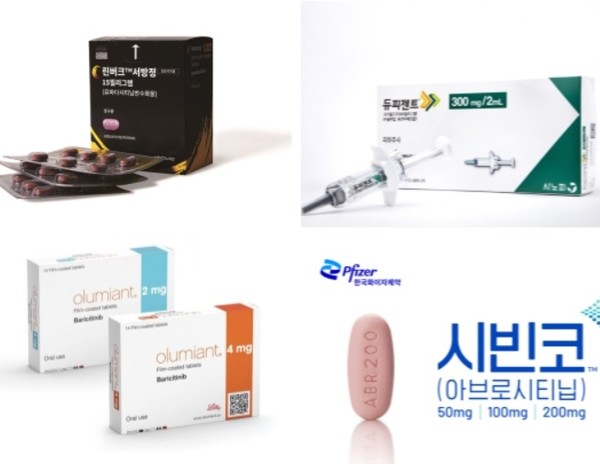The U.S. FDA recently approved two JAK inhibitors – AbbVie’s Rinvoq (upadacitinib) and Pfizer’s Cibinqo (abrocitinib) – to treat atopic dermatitis on the condition that JAK inhibitors are given to those who have already received systemic therapy, including biologics.
In Korea, the Ministry of Food and Drug Safety does not provide any guidance on treatment priority among next-generation JAK inhibitors in atopic dermatitis treatment.

Industry watchers are paying attention to whether the latest FDA decision will affect the Korean regulations.
The FDA has been delaying the decision on Rinvoq due to a safety review but granted the nod on Friday.
Rinvoq is indicated for the treatment of moderate to severe atopic dermatitis in adults and children aged 12 and older whose disease did not respond to previous treatment and is not well controlled with other pills or injections, including biologic medicines, or when the use of other pills or injections is not recommended.
Rinvoq 15 mg once daily can be administered to adults and children aged 12 and older, weighing at least 40 kg. In addition, the dose may be increased to 30 mg once daily in children and adults aged less than 65 who do not achieve an adequate response.
On the same day, the FDA cleared Pfizer’s Cibinqo to treat atopic dermatitis.
Cibinqo is indicated for treating adults with refractory, moderate-to-severe atopic dermatitis whose disease is not adequately controlled with other systemic drugs, including biologics, or when the use of those therapies is inadvisable.
The recommended dose is 100 mg and 200 mg once daily, with the 200 mg dose being recommended for patients who are not responding to the 100 mg dose.
However, a 50 mg dose was approved for patients with moderate renal impairment, those receiving treatment with inhibitors of cytochrome P450 (CYP) 2C19, or those who are known or suspected to be poor metabolizers of CYP2C19. In addition, the dose can be increased to 100 mg for those who do not respond to the 50 mg dose.
The two JAK inhibitors were indicated for patients whose atopic dermatitis was not controlled by systemic therapies, including biologic agents such as Dupixent (dupilumab). Instead, they have become second-line systemic therapy in atopic dermatitis.
When the first-generation JAK inhibitor Xeljanz (tofacitinib), a treatment of rheumatoid arthritis, reported the risk of malignancy and thrombosis in the long-term safety monitoring, the FDA raised the same concern for Lilly’s Olumiant (baricitinib) and AbbVie’s Rinvoq and issued a safety concern. As a result, the regulator ordered those drugs after TNF inhibitors in treating rheumatoid arthritis.
The FDA requires all JAK inhibitors to display warnings about the increased risk of serious cardiovascular events, blood clots, cancer, and death.
Earlier, the FDA extended the review period for approval of JAK inhibitors’ atopic dermatitis indication due to safety issues several times.
Both Rinvoq and Cibinqo won the marketing approval for treating atopic dermatitis in Korea earlier than in the U.S. They were indicated as systemic therapy for the treatment of moderate-to-severe atopic dermatitis.
The Korean regulator did not place any restriction on the treatment order.
As the Korean health insurance review agency discusses reimbursement for next-generation JAK inhibitors for atopic dermatitis treatment, industry watchers are closely watching whether the FDA decision will affect the reimbursement criteria for these drugs in Korea.

